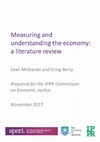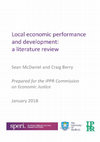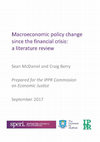Papers by Sean McDaniel

New Political Economy, 2019
This article critiques and builds upon first-wave (Höpner and Schäfer 2010) and second-wave (John... more This article critiques and builds upon first-wave (Höpner and Schäfer 2010) and second-wave (Johnston and Regan 2018) European Integration and comparative capitalisms literatures which posit convergence towards a single model of capitalism or growth. It utilises the case study of France to explore the impact of European integration and disintegration on national models of capitalism in the post-crisis era. The article focuses on the impact of integrative and disintegrative dynamics on France's 'state-industry-finance nexus', putting forward three core claims. First, French capitalism is not accurately captured by the above frameworks and remains better characterised by the concept of post-dirigisme. Indeed, comparative capitalisms debates must move beyond a simple bifurcation of capitalist types. Second, European integrative pressures must be viewed as fragmented, differentiating, mediated by domestic state actors and productive of capitalist variegation and hybridisation. Countering functionalist tendencies within this literature, it shows how different conceptions of state-market relations crucially mediate the relationship between national capitalisms and European integration. Finally, in the context of Brexit, the dynamics of European disintegration-an issue not discussed so far in these debates-is contributing to a variegated and multi-directional process of capitalist restructuring in post-crisis France.

New Political Economy, 2019
This article critiques and builds upon first-wave (Höpner and Schäfer 2010) and second-wave (John... more This article critiques and builds upon first-wave (Höpner and Schäfer 2010) and second-wave (Johnston and Regan 2018) European Integration and comparative capitalisms literatures which posit convergence towards a single model of capitalism or growth. It utilises the case study of France to explore the impact of European integration and disintegration on national models of capitalism in the post-crisis era. The article focuses on the impact of integrative and disintegrative dynamics on France’s ‘state-industry-finance nexus’, putting forward three core claims. First, French capitalism is not accurately captured by the above frameworks and remains better characterised by the concept of post-dirigisme. Indeed, comparative capitalisms debates must move beyond a simple bifurcation of capitalist types. Second, European integrative pressures must be viewed as fragmented, differentiating, mediated by domestic state actors and productive of capitalist variegation and hybridisation. Countering functionalist tendencies within this literature, it shows how different conceptions of state-market relations crucially mediate the relationship between national capitalisms and European integration. Finally, in the context of Brexit, the dynamics of European disintegration – an issue not discussed so far in these debates – is contributing to a variegated and multi-directional process of capitalist restructuring in post-crisis France.

Geoforum, 2018
The UK’s exit from the EU is unlikely to challenge the City of London’s position as Europe’s lead... more The UK’s exit from the EU is unlikely to challenge the City of London’s position as Europe’s leading international financial centre (IFC). However, Brexit does create opportunities for alternative financial centres located inside the remaining EU member states. In this article, we assess the strategic positioning of private and public actors within two European IFCs - Frankfurt and Paris - in the period following the Brexit vote. Agents within these centres are seeking to differentially benefit from Brexit in two distinct ways: by mobilising to attract ‘low hanging fruit’ – vulnerable financial sub-sectors – away from the City and by utilising Brexit as a ‘bargaining chip’ to leverage domestic and European regulatory reforms. In light of these findings we argue that existing approaches to financial centre relations - in particular ‘Globalisation and World Cities’ research - should engage with the ways in which political actors shape European financial relations. Whilst private actors inside financial ‘networks’ may agitate for continued ‘cooperation’ and regulatory convergence after Brexit, new competitive orientations are also in evidence as political actors seek to privilege their territories relative to rival spaces.

Modern and Contemporary France, 2017
With the extraordinary rise of Emmanuel Macron and the near complete collapse of the Parti Social... more With the extraordinary rise of Emmanuel Macron and the near complete collapse of the Parti Socialiste (PS), the past year has seen arguably the most dramatic upheaval in the French party system since 1958. This article develops a political economy analysis of the Hollande quinquennat to better understand how we arrived here. It argues that Hollande’s programmatic failures must be situated within an institutional account of the constraints of the presidential logic of the Fifth Republic and tensions between competing factional courants within the Socialist Party. Here we shed fresh light on this moment of rupture by situating a political economy analysis of Hollande’s economic programme within a more intricate institutional analysis of the specificities of the PS and its position within the Fifth Republic. The article traces the most salient political developments of the 2017 elections and outlines the political landscape of the contemporary French left. It suggests that in doing so, it is possible to understand why, after numerous crises of French socialism, this time is different.
Renewal, 2017
With the failure of President Hollande’s anti-austerity programme and promise of ‘le changement’,... more With the failure of President Hollande’s anti-austerity programme and promise of ‘le changement’, ahead of this year’s elections in France, the Parti Socialiste finds itself severely weakened and perhaps even at breaking point.
French Politics, 2014
Two decades ago many commentators suggested that economic globalisation had eroded social democra... more Two decades ago many commentators suggested that economic globalisation had eroded social democratic economic policy capacity. Although this argument has largely been discredited, the global financial crisis has revived the state-market debate. As governments succumb to fiscal consolidation, a similar theory of declining state capacity now challenges social democrats. This article redresses the contemporary situation by using the economic globalisation debate from the mid-1990s to 2005 as a lens through which to comparatively analyse the current fiscal policy positions of the Parti Socialiste and the Labour Party. It draws similarities between the two situations and illustrates how contested notions of the contemporary political economy constrain social democratic fiscal policy capacity, suggesting that greater capacity exists than is currently acknowledged.
Book Reviews by Sean McDaniel
A review of David S. Bell and Byron Criddle's 2014 book on the Parti Socialiste, 'Exceptional Soc... more A review of David S. Bell and Byron Criddle's 2014 book on the Parti Socialiste, 'Exceptional Socialists: The Case of the French Socialist Party'.
Other papers and reports (selected) by Sean McDaniel
This brief analyses the positions of key employer organisations within Germany, France and Irelan... more This brief analyses the positions of key employer organisations within Germany, France and Ireland in relation to Brexit and their trading relationship with the UK.
A SPERI report for GMB
The report sets out a range of examples of how and where political action... more A SPERI report for GMB
The report sets out a range of examples of how and where political action is being taken around the world to tackle different forms of insecure work and improve job security.
It highlights new legislation, campaigns and partnerships that seek to protect and enhance workers’ rights and to restrict and challenge insecure forms of work.
This Brief assesses the strategic positioning of alternative financial centres in the aftermath o... more This Brief assesses the strategic positioning of alternative financial centres in the aftermath of Brexit. It shows how three major rivals to the City are organising to attract ‘low hanging fruit’ from London.
This review of the existing literature – commissioned by the IPPR Commission on Economic Justice ... more This review of the existing literature – commissioned by the IPPR Commission on Economic Justice – on work, labour markets and welfare covers three distinct aspects of economic activity, which occur both within and outside of formal labour markets. While separate, the review attempts to highlight how each aspect covered is both a product of, and helps to perpetuate, underlying core features of the UK’s economic growth model, which relies currently upon highly liberalised labour markets. The review concludes by outlining a progressive policy agenda by way of summarising key lessons identified in the literature.
This literature review – commissioned by the IPPR Commission on Economic Justice – considers the ... more This literature review – commissioned by the IPPR Commission on Economic Justice – considers the economic impact of digital platforms and Big Data from the perspective of competition policy. It first outlines the key tenets of, and developments in, UK competition policy, before considering the challenges that the digital economy – and its powerful
incumbent – for protecting and enhancing competition. A final section briefly outlines a progressive policy agenda in response to these developments.
This literature review – commissioned by the IPPR Commission on Economic Justice – considers issu... more This literature review – commissioned by the IPPR Commission on Economic Justice – considers issues around corporate governance, specifically the prospect of greater prevalence for ‘alternative’
forms of company ownership to that which is dominant in the UK economy.

Gross Domestic Product (GDP) is the measure of all final goods and services produced and traded w... more Gross Domestic Product (GDP) is the measure of all final goods and services produced and traded within an economy in a given period of time, typically measured by adding together personal consumption, government expenditure, net exports and net capital formation. Despite seemingly being a mere unit of measurement, the use of GDP has attracted a significant amount of criticism, particularly for the way in which the concept has often been used by politicians and policy makers as shorthand for economic progress or an indicator of wider societal well-being (see Costanza et al. 2009). This is not, of course, a new criticism. Simon Kuznets, one of the co-creators of GDP, warned in the 1930s against the misappropriation of the concept, arguing that ‘the welfare of a nation can …scarcely be inferred from a measurement of national income’ (Kuznets, 1934). As we shall see, GDP does not capture a number of critical aspects of a nation’s welfare, including the quality of its citizen’s lives, equality between those citizens and the depletion of natural resources, whilst it actively shapes the way in which policy makers see the economy and look to shape future growth – fuelling short term measures to boost economic growth today, at the cost of long-term decline or by adding to our carbon emissions. Nevertheless, for decades following the Second World War, GDP growth became the key focus for economic policy makers, acting a key frame for measuring and understanding an economy underpinned by the then-dominant Keynesian settlement (see Syrquin 2016), and remains so today. Moreover, whilst many assumed the global financial crisis
might throw GDP’s utility into doubt, and thus allow for the promotion of alternative measurements, in reality the crisis served only to reinforce a traditional growth agenda as governments pursued economic recovery (Bleys and Whitby 2015). This review of the literature seeks to both explore the limitations of GDP in measuring aspects of our economy and society, as well as alternative ways of measuring and understanding the economy.

Severe geographical inequalities, it seems, are a constitutive element of the British political e... more Severe geographical inequalities, it seems, are a constitutive element of the British political economy. Whilst the South of England, and especially London, has prospered since the deregulation of financial services in the 1980s, the economic performance of the rest of the country has been under-whelming, and often alarming. But the ‘North-South’ divide in the
UK’s economic performance extends much further back than the past four decades (Berry and Giovannini 2017; Martin and Gardiner 2017). Furthermore, not only does the UK have one of the highest levels of spatial inequality among developed countries (McCann 2016; MacKinnon et al. 2015), but it also has ‘one of the most centralised systems of sub-national government finance, whereby local authorities are heavily dependent on transfers from central government’ (MacKinnon et al. 2015). The limits of decentralisation and the de facto
and de jure concentration of power in London is seen to entrench spatial imbalances and uneven patterns of economic development in the UK, by producing a London-centric focus amongst policy-makers (MacKinnon et al. 2015). Accordingly, much discussion of local economic performance in the UK is accompanied by discussion of the prospects for greater devolution of powers to regional and local authorities. The purpose of this review is, primarily, to summarise and assess the literature on local economic development in the UK (occasionally drawing upon evidence from other countries, where relevant); that is, seeking to move beyond a purely regional perspective on the UK’s
economic geography, and instead codify evidence and perspectives on the sub-regional level. Alas, the distinctions between regional and local are, at times, somewhat blurred within the literature. This is most apparent in analysis of the UK’s large cities, which are technically
sub-regional economic spaces but often incorporated into debates about regional economic performance (with the London city-region being the exception that proves the rule in this regard). Of course, we start from the assumption that understanding economic performance
and development at any spatial scale necessarily requires us to understand dynamics within the broader landscapes within which localities exist.

This review, into macroeconomic policy change since the financial crisis, was commissioned by the... more This review, into macroeconomic policy change since the financial crisis, was commissioned by the IPPR Commission on Economic Justice. It is divided into three parts – fiscal policy, monetary policy and trade – and answers nine central questions across the three parts:
Fiscal policy: 1. How much do fiscal rules vary, and what has been the impact of different rules? 2. How prevalent are independent fiscal councils, and what has been their impact? 3. How have the costs and benefits of fiscal risks been assessed and modelled?
Monetary policy: 4. Is ‘secular stagnation’ still a useful way of understanding post-crisis capitalism? 5. What is the case for and against negative interest rates? 6. How much do central bank mandates vary, and what has been the impact of different mandates?
Trade and globalisation: 7. What is the trend in current account balances for both advanced and developing countries? 8. How have advanced countries sought to improve their current account balance, and what accounts for an successful cases? 9. In advanced economies, what are the theoretical and empirically observed relationships between the effective exchange rate and (a) current account balances, and (b) living standards?

There have been few attempts to understand the experiences, opinions and attitudes of younger peo... more There have been few attempts to understand the experiences, opinions and attitudes of younger people regarding the economic crisis, its aftermath and the rise of ‘the hourglass economy’ more generally. Are today’s young people content to work within ‘the new normal’, or are they willing to challenge prevailing economic circumstances in order to refashion the labour market? When discussed within the media and elsewhere, the values and attitudes of young workers are often assumed to be aligned to an age of freelance work, job hopping and ndividualisation. The stereotypes around Generation Y or Millennials (approximately those born in the two decades from 1980 until 2000), which see this younger workforce as apathetic, individualistic and content to embrace a less secure working life do not stand up to scrutiny. Presenting new evidence from a series of focus groups, the report focuses primarily interested therefore on post-crisis attitudes to the ‘professional’ realm of work, employment, pay, training and education. But it is also in how these attitudes relate to wider economic issues such as distribution, debt, housing and public spending, and indeed attitudes to politics. An important, secondary concern, however, will be to develop an understanding of how today’s young people can be mobilised in the transformation of the hourglass economy. It inquires specifcally into attitudes to trade unionism, as a vehicle for both eonomic and political transformation. In short, are young people resigned to conforming to the labour market structures they have inherited – or are they prepared to confront this inheritance?
As such, three key questions underpin the research presented here: 1. What is the attitude of young people towards work and employment, and their economic circumstances and economic futures more broadly? 2. How are traditional industrial relations, includingthe role of trade unions, seen by today’s young people? 3. Is there evidence that the crisis (and policy responses) triggered change in attitudes, behaviour or expectations among young people, or was the crisis seen as a routine part of economic life?
This Brief presents new research on the perspectives of young people on the economy, crisis, the ... more This Brief presents new research on the perspectives of young people on the economy, crisis, the labour market and politics. Young people appear to be on the front line of structural change within the economy, evidenced by a stratification within the labour market between secure, high-skilled employment and precarious, low-skilled employment. Utilising focus group research the brief considers whether young people are content to work within ‘the new normal’, and whether they are willing to challenge prevailing economic circumstances in order to refashion the labour market.











Uploads
Papers by Sean McDaniel
Book Reviews by Sean McDaniel
Other papers and reports (selected) by Sean McDaniel
The report sets out a range of examples of how and where political action is being taken around the world to tackle different forms of insecure work and improve job security.
It highlights new legislation, campaigns and partnerships that seek to protect and enhance workers’ rights and to restrict and challenge insecure forms of work.
incumbent – for protecting and enhancing competition. A final section briefly outlines a progressive policy agenda in response to these developments.
forms of company ownership to that which is dominant in the UK economy.
might throw GDP’s utility into doubt, and thus allow for the promotion of alternative measurements, in reality the crisis served only to reinforce a traditional growth agenda as governments pursued economic recovery (Bleys and Whitby 2015). This review of the literature seeks to both explore the limitations of GDP in measuring aspects of our economy and society, as well as alternative ways of measuring and understanding the economy.
UK’s economic performance extends much further back than the past four decades (Berry and Giovannini 2017; Martin and Gardiner 2017). Furthermore, not only does the UK have one of the highest levels of spatial inequality among developed countries (McCann 2016; MacKinnon et al. 2015), but it also has ‘one of the most centralised systems of sub-national government finance, whereby local authorities are heavily dependent on transfers from central government’ (MacKinnon et al. 2015). The limits of decentralisation and the de facto
and de jure concentration of power in London is seen to entrench spatial imbalances and uneven patterns of economic development in the UK, by producing a London-centric focus amongst policy-makers (MacKinnon et al. 2015). Accordingly, much discussion of local economic performance in the UK is accompanied by discussion of the prospects for greater devolution of powers to regional and local authorities. The purpose of this review is, primarily, to summarise and assess the literature on local economic development in the UK (occasionally drawing upon evidence from other countries, where relevant); that is, seeking to move beyond a purely regional perspective on the UK’s
economic geography, and instead codify evidence and perspectives on the sub-regional level. Alas, the distinctions between regional and local are, at times, somewhat blurred within the literature. This is most apparent in analysis of the UK’s large cities, which are technically
sub-regional economic spaces but often incorporated into debates about regional economic performance (with the London city-region being the exception that proves the rule in this regard). Of course, we start from the assumption that understanding economic performance
and development at any spatial scale necessarily requires us to understand dynamics within the broader landscapes within which localities exist.
Fiscal policy: 1. How much do fiscal rules vary, and what has been the impact of different rules? 2. How prevalent are independent fiscal councils, and what has been their impact? 3. How have the costs and benefits of fiscal risks been assessed and modelled?
Monetary policy: 4. Is ‘secular stagnation’ still a useful way of understanding post-crisis capitalism? 5. What is the case for and against negative interest rates? 6. How much do central bank mandates vary, and what has been the impact of different mandates?
Trade and globalisation: 7. What is the trend in current account balances for both advanced and developing countries? 8. How have advanced countries sought to improve their current account balance, and what accounts for an successful cases? 9. In advanced economies, what are the theoretical and empirically observed relationships between the effective exchange rate and (a) current account balances, and (b) living standards?
As such, three key questions underpin the research presented here: 1. What is the attitude of young people towards work and employment, and their economic circumstances and economic futures more broadly? 2. How are traditional industrial relations, includingthe role of trade unions, seen by today’s young people? 3. Is there evidence that the crisis (and policy responses) triggered change in attitudes, behaviour or expectations among young people, or was the crisis seen as a routine part of economic life?
The report sets out a range of examples of how and where political action is being taken around the world to tackle different forms of insecure work and improve job security.
It highlights new legislation, campaigns and partnerships that seek to protect and enhance workers’ rights and to restrict and challenge insecure forms of work.
incumbent – for protecting and enhancing competition. A final section briefly outlines a progressive policy agenda in response to these developments.
forms of company ownership to that which is dominant in the UK economy.
might throw GDP’s utility into doubt, and thus allow for the promotion of alternative measurements, in reality the crisis served only to reinforce a traditional growth agenda as governments pursued economic recovery (Bleys and Whitby 2015). This review of the literature seeks to both explore the limitations of GDP in measuring aspects of our economy and society, as well as alternative ways of measuring and understanding the economy.
UK’s economic performance extends much further back than the past four decades (Berry and Giovannini 2017; Martin and Gardiner 2017). Furthermore, not only does the UK have one of the highest levels of spatial inequality among developed countries (McCann 2016; MacKinnon et al. 2015), but it also has ‘one of the most centralised systems of sub-national government finance, whereby local authorities are heavily dependent on transfers from central government’ (MacKinnon et al. 2015). The limits of decentralisation and the de facto
and de jure concentration of power in London is seen to entrench spatial imbalances and uneven patterns of economic development in the UK, by producing a London-centric focus amongst policy-makers (MacKinnon et al. 2015). Accordingly, much discussion of local economic performance in the UK is accompanied by discussion of the prospects for greater devolution of powers to regional and local authorities. The purpose of this review is, primarily, to summarise and assess the literature on local economic development in the UK (occasionally drawing upon evidence from other countries, where relevant); that is, seeking to move beyond a purely regional perspective on the UK’s
economic geography, and instead codify evidence and perspectives on the sub-regional level. Alas, the distinctions between regional and local are, at times, somewhat blurred within the literature. This is most apparent in analysis of the UK’s large cities, which are technically
sub-regional economic spaces but often incorporated into debates about regional economic performance (with the London city-region being the exception that proves the rule in this regard). Of course, we start from the assumption that understanding economic performance
and development at any spatial scale necessarily requires us to understand dynamics within the broader landscapes within which localities exist.
Fiscal policy: 1. How much do fiscal rules vary, and what has been the impact of different rules? 2. How prevalent are independent fiscal councils, and what has been their impact? 3. How have the costs and benefits of fiscal risks been assessed and modelled?
Monetary policy: 4. Is ‘secular stagnation’ still a useful way of understanding post-crisis capitalism? 5. What is the case for and against negative interest rates? 6. How much do central bank mandates vary, and what has been the impact of different mandates?
Trade and globalisation: 7. What is the trend in current account balances for both advanced and developing countries? 8. How have advanced countries sought to improve their current account balance, and what accounts for an successful cases? 9. In advanced economies, what are the theoretical and empirically observed relationships between the effective exchange rate and (a) current account balances, and (b) living standards?
As such, three key questions underpin the research presented here: 1. What is the attitude of young people towards work and employment, and their economic circumstances and economic futures more broadly? 2. How are traditional industrial relations, includingthe role of trade unions, seen by today’s young people? 3. Is there evidence that the crisis (and policy responses) triggered change in attitudes, behaviour or expectations among young people, or was the crisis seen as a routine part of economic life?